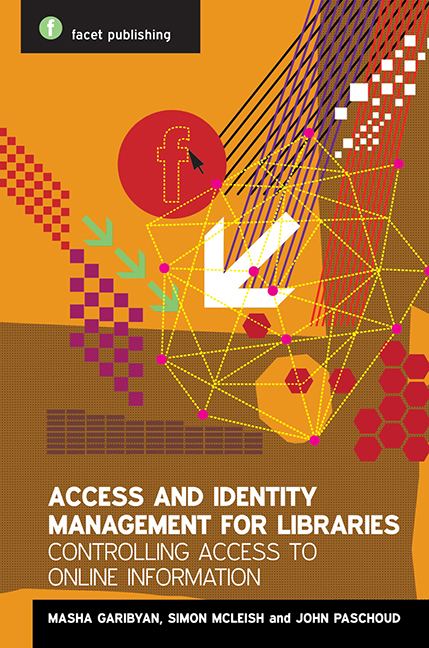Book contents
- Frontmatter
- Contents
- Foreword
- Acknowledgements
- Note to readers
- Glossary
- 1 What is access management, and why do libraries do it?
- 2 Electronic resources: public and not so public
- 3 Principles and definitions of identity and access management
- 4 Current access management technologies
- 5 Authentication technologies
- 6 Authorization based on physical location: how does the internet know where I am?
- 7 Authorization based on user identity or affiliation with a library: who you are? Or what you do?
- 8 Federated access: history, current position and future developments
- 9 How to choose access management and identity management products and services
- 10 Internet access provided by (or in) libraries
- 11 Library statistics
- 12 The business case for libraries
- Afterword
- Appendix 1 Case studies
- Appendix 2 A White Paper on Authentication and Access Management Issues in Cross-organizational Use of Networked Information Resources
- Index
Afterword
Published online by Cambridge University Press: 10 September 2022
- Frontmatter
- Contents
- Foreword
- Acknowledgements
- Note to readers
- Glossary
- 1 What is access management, and why do libraries do it?
- 2 Electronic resources: public and not so public
- 3 Principles and definitions of identity and access management
- 4 Current access management technologies
- 5 Authentication technologies
- 6 Authorization based on physical location: how does the internet know where I am?
- 7 Authorization based on user identity or affiliation with a library: who you are? Or what you do?
- 8 Federated access: history, current position and future developments
- 9 How to choose access management and identity management products and services
- 10 Internet access provided by (or in) libraries
- 11 Library statistics
- 12 The business case for libraries
- Afterword
- Appendix 1 Case studies
- Appendix 2 A White Paper on Authentication and Access Management Issues in Cross-organizational Use of Networked Information Resources
- Index
Summary
The purpose of this book has been to describe how recent developments in access management technologies have affected the world of the library. The case studies which follow are concrete examples of how libraries around the world have adopted access management concepts and adapted them to fit their own situations, whether academic or public, large or small.
In the world in which we now live, in which even the most famous libraries have to compete for scarce resources, is it possible to still make a case for investment in identity management? The authors believe that it is, and not only that, but that it is essential to do so: for ease of management, for risk amelioration, and to ease the path for the library user to access the resource which they want to use.
It is impossible to predict the future accurately. Even science fiction writer Isaac Asimov, famed for his ability to suggest the implications of new science for society, wrote a short story which he later described (Asimov, 1975) in the following terms: ‘I predicted that Mount Everest would never be climbed, five months after it was climbed’. Even bearing this and other examples in mind, however, we would like to present some final thoughts about the future of access management in libraries.
Access management is not going to go away in the short term. Some individuals have suggested that copyright will or should become a thing of the past (e.g. Richmond, 2011) – along with privacy (Mark Zuckerberg, quoted in Johnson, 2010), and the physical book (e.g. Coover, 1992). But it seems more likely that individuals and, probably more importantly, corporate entities, will continue to wish to restrict access to at least some of the items they produce. Indeed, the introduction of ‘paywalls’ restricting access to paying subscribers by several formerly free newspaper websites in recent years (BBC News, 2013) is one indication that this desire is becoming more acute to some. Any such information necessitates some form of access management, to keep out those who have no right to access, while making it as easy as possible for those who should be able to access it to do so.
Libraries are undergoing a process of rapid change in the internet age.
- Type
- Chapter
- Information
- Access and Identity Management for LibrariesControlling Access to Online Information, pp. 155 - 158Publisher: FacetPrint publication year: 2014



